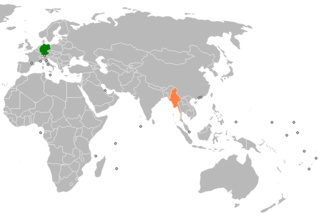
Raymond Claude Ferdinand Aron was a French philosopher, sociologist, political scientist, historian and journalist, one of France's most prominent thinkers of the 20th century.

The European Mathematical Society (EMS) is a European organization dedicated to the development of mathematics in Europe. Its members are different mathematical societies in Europe, academic institutions and individual mathematicians. The current president is Jan Philip Solovej, professor at the Department of Mathematics at the University of Copenhagen.

A strikebreaker is a person who works despite an ongoing strike. Strikebreakers may be current employees, or new hires, who are hired after or during the strike to keep the organization running. In continuing to work, or taking jobs at a workplace under current strike, strikebreakers are said to "cross picket lines".
Alina Mungiu-Pippidi is a Romanian political scientist, academic, journalist and writer. She currently holds the professorship of Comparative Public Policy at the Department of Political Science of LUISS Guido Carli in Rome. She also chairs the multi-site European Research Centre for Anticorruption and State-Building (ERCAS) and is Academic Coordinator of BridgeGap, an EU Horizon research project. Alina Mungiu-Pippidi also holds the honorary presidency of Romanian Academic Society. She also consults for various governments and international organizations and contributed work for the European Parliament as principal investigator on ‘clean trade’, the Swedish Government on effectiveness of good governance assistance programs, the EU Dutch Presidency on trust and public integrity in EU-28, for the European Commission DG Research on governance innovation, for the World Bank Development Report and the International Monetary Fund, among others.
Sebastian Harnisch is Professor of International Relations and Foreign Policy at the Faculty of Economic and Social Sciences of the University of Heidelberg.
Eckhard Jesse is a German political scientist. Born in Wurzen, Saxony, he held the chair for "political systems and political institutions" at the Technical University of Chemnitz from 1993 to 2014. Jesse is one of the best known German political scholars in the field of extremism and terrorism studies. He has also specialized in the study of German political parties and the German political system.

The 1955 Austrian State Treaty ended the four-power occupation and recognized Austria as an independent and sovereign state. In October 1955, the Federal Assembly passed a constitutional law in which "Austria declares of her own free will her perpetual neutrality." The second section of this law stated that "in all future times Austria will not join any military alliances and will not permit the establishment of any foreign military bases on her territory." Since then, Austria has shaped its foreign policy on the basis of neutrality.

The Saltsjöbaden Agreement is a Swedish collective agreement signed between the Swedish Trade Union Confederation and the Swedish Employers Association on 20 December 1938, that became a model for other agreements. The rules on industrial action have come to be regarded almost as general legal principles of industrial conflicts between the labour market forces. The agreement cemented the Swedish social norm that the two sides shall conclude agreements without interference by government. The agreement is still in effect, with the latest changes being made in 2022.
Stefan Fröhlich is a German political scientist and professor for International Relations at the Friedrich-Alexander-University Erlangen-Nuremberg. The emphasis in his work is on German foreign policy, transatlantic relations and US foreign policy, European foreign and security policy, and International Political Economy.
MindSphere is an industrial IoT-as-a-service solution developed by Siemens for applications in the context of the Internet of Things (IoT). MindSphere stores operational data and makes it accessible through digital applications to allow industrial customers to make decisions based on valuable factual information. The system is used in applications such as automated production and vehicle fleet management.
Karin Flaake is a German sociologist and professor (retired) at the Carl von Ossietzky University Oldenburg. Her publications on the adolescence of young women and men are part of the literature of socio-psychologically oriented gender research. Another focus of her work is on the chances of changing gender relations in families.
Allan Flanders was a British academic, author, and founding member of the Oxford School of Industrial Relations, along with Hugh Clegg, Alan Fox, Lord William McCarthy, Sir George Bain and Otto Kahn-Freund. The school was a developer of the idea of collective bargaining and overall proponents of bargaining power, legal contracts, normative regulation and institutionalized conflict resolutions as issues of significance and focus in the field of industrial relations.

Ulrich Menzel is a German political scientist.

Switzerland–Yugoslavia relations were historical foreign relations between Switzerland and now broken up Yugoslavia. Switzerland established diplomatic relations with the Yugoslavia in 1919. A Swiss legation was established in Belgrade in 1940, which was upgraded to an embassy in 1957.

Germany and Thailand share bilateral relations officially dating to 1858. Thailand has an embassy in Berlin, consulates generals in Frankfurt and Munich and Germany has an embassy in Bangkok.

Germany–Rwanda relations are good and there is a "close and pragmatic" relationship between the two countries, according to the German Foreign Office. In the 21st century, Germany is one of the most important donors of development aid to Rwanda.

In 2014, the Federal Republic of Germany and the Republic of the Union of Myanmar celebrated the 60th anniversary of Germany–Myanmar relations.

The quality of Germany–Guinea relations has been subject to some fluctuations since bilateral relations were established in 1958. Due to its long history of cooperation in development policy, the Federal Republic of Germany enjoys a good reputation among the Guinean public.
A Group Works Council also called a Combine Works Council can optionally be established by any Central Works Council belonging to the corporate group headquartered in Germany according to BetrVG § 54(1). Sections § 54-59a of the Works Constitution Act (BetrVG) directly pertain to Group Works Councils.










